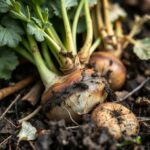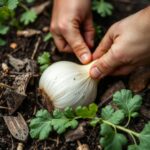Does Compost Eventually Turn into Soil? Understanding the Transformation Process

Composting is a natural process that transforms organic waste into a valuable resource for gardens and landscapes. As we toss kitchen scraps, yard debris, and other biodegradable materials into the compost pile, many wonder if and how this mixture truly turns into soil. Understanding the transformation process is essential for gardeners, environmentalists, and anyone interested in sustainable practices. This article will explore the stages of composting, the microorganisms involved, and the conditions necessary for successful decomposition. By delving into the science behind composting, we can appreciate its role in enriching our soil and promoting a healthier ecosystem.
Does Compost Eventually Turn Into Soil?
Compost indeed goes through a transformation process, eventually turning into a rich, dark substance similar to soil known as humus. This transformation occurs as microorganisms, such as bacteria and fungi, break down organic matter, including food scraps and yard waste, over time. The resulting compost is nutrient-dense and aids in enhancing soil structure, moisture retention, and the overall health of plants. During this process, the initial materials undergo a change in composition, leading to the formation of essential minerals and nutrients that benefit plant growth, making compost not just a waste product but a valuable resource for agriculture and gardening.
What Is Compost?
Compost is a mixture of decomposed organic materials, such as food scraps, yard waste, and other biodegradable items, that provides a nutrient-rich substrate for plants. It is the result of the natural decomposition process facilitated by microorganisms and helps enhance soil health when used in gardening and landscaping. Composting not only reduces waste sent to landfills but also returns valuable nutrients back to the ecosystem.
How Long Does It Take for Compost to Turn into Soil?
The duration for compost to turn into a usable soil amendment can vary greatly depending on factors such as temperature, moisture, and the materials included in the compost pile. Generally, compost can take anywhere from a few weeks to several months to decompose fully. In warm conditions with optimal moisture, the process can be quicker, while cooler or dryer conditions may extend the time frame. Regular turning of the compost pile can also speed up the process by introducing oxygen, which aids in microbial growth.
What Happens During the Composting Process?
During the composting process, several stages occur, beginning with the initial breakdown of organic materials by microorganisms. This stage is followed by the thermophilic phase, where temperatures rise, killing off pathogens and weed seeds. Afterward, the materials cool down, and a diverse range of microorganisms further decomposes the remnants. Finally, the compost matures, becoming stable and nutrient-rich. This entire process creates a humus-like substance that resembles soil, enhancing soil fertility.
See also:
The Nutritional Benefits of Compost
Compost is a powerhouse of nutrients vital for plant growth. It enriches the soil with nitrogen, phosphorus, potassium, and a myriad of trace elements essential for plant health. Additionally, compost improves soil structure, supporting better drainage and moisture retention, which allows roots to access nutrients more effectively. By applying compost to the soil, gardeners can cultivate more robust and resilient plants that can thrive in various conditions.
Can All Organic Matter Be Used for Composting?
While many types of organic matter are ideal for composting, not all materials should be included. Suitable items like fruit and vegetable scraps, grass clippings, and leaves contribute positively to the compost pile. Conversely, materials such as meat, dairy products, and oily substances can attract pests and cause unpleasant odors. Additionally, synthetic chemicals, such as pesticides and herbicides, can harm the composting process and soil health. It’s essential to balance green materials (high in nitrogen) and brown materials (high in carbon) for an effective compost mix.
| Material Type | Good for Composting? |
|---|---|
| Fruit and Vegetable Scraps | Yes |
| Grass Clippings | Yes |
| Meat and Dairy Products | No |
| Leaves | Yes |
| Pesticide-treated Materials | No |
The Role of Microorganisms in Compost to Soil Transformation
The transformation of compost into soil is largely driven by the activity of microorganisms, including bacteria and fungi, which decompose organic matter. During this decomposition process, these microorganisms break down complex organic materials into simpler compounds, enriching the compost with nutrients. As they work, they also enhance the structure of the compost, making it more conducive to soil formation. This microbial action promotes aeration and increases the retention of moisture, ultimately contributing to the creation of humus—the dark, nutrient-rich substance essential for healthy soil. Over time, with continued microbial activity and optimal environmental conditions, the compost matures into a substance that closely resembles rich, fertile soil.
Understanding the Composting Process
The composting process involves the aerobic decomposition of organic materials, such as kitchen scraps and yard waste. During this process, microorganisms consume the organic matter, producing heat which accelerates decomposition. After several weeks to months, depending on variables like temperature and moisture, the compost becomes a dark, crumbly material rich in nutrients. This completed compost is not soil yet, but it contains essential ingredients that will lead to soil formation when added to existing soil.
The Importance of Carbon to Nitrogen Ratio
A critical factor in successful composting and its transformation into soil is the carbon-to-nitrogen (C:N) ratio of the composting materials. A balanced C:N ratio, ideally around 30:1, ensures that microorganisms have the right amount of energy and nitrogen for optimal decomposition. Too much carbon leads to slower decomposition, while too much nitrogen can cause odors and anaerobic conditions. Achieving this balance encourages rapid microbial activity, facilitating the transition from compost to rich, fertile soil.
See also:
How Soil Microorganisms Benefit from Compost
When compost is incorporated into existing soil, it significantly enhances the biodiversity of soil microorganisms. These beneficial soil microbes feed off the organic matter in compost, improving soil health and structure. The introduction of compost increases microbial activity, which further enhances nutrient cycling and plant growth. Additionally, the presence of compost helps suppress soil-borne diseases, promoting a healthier ecosystem for surrounding plants.
The Role of Environmental Conditions
Environmental conditions such as moisture, temperature, and oxygen availability play vital roles in the speed and efficiency of the composting and subsequent soil formation processes. Adequate moisture supports microbial activity, while optimal temperatures (between 130°F to 160°F) promote rapid decomposition. Moreover, ensuring proper aeration prevents anaerobic conditions, which can hinder the transformation of compost into quality soil. Monitoring these factors is essential for achieving the desired outcomes in composting.
The Timeframe for Compost to Become Soil
The timeframe for compost to fully transform into soil can vary widely based on the methods used and the materials involved. Typically, compost may look like soil after several months; however, the true maturity process can take years. Factors influencing this timeframe include the initial materials, environmental conditions, and microbial diversity present. As the compost continues to break down and interacts with native soil organisms, it gradually loses its identifiable characteristics, becoming a functional component of the soil ecosystem.
Questions from Our Readers
Does compost eventually turn into soil?
Yes, compost will eventually break down and transform into a rich, dark substance that resembles soil, often referred to as humus. This process can take several months to a couple of years, depending on factors like moisture, temperature, and the materials used in the compost.
What is the difference between compost and soil?
Compost is primarily made up of decomposed organic matter, while soil is a complex mixture that includes minerals, organic matter, air, and water. Compost enriches the soil by improving its structure and providing essential nutrients for plants.
See also:
How long does it take for compost to turn into soil?
The time it takes for compost to turn into soil can vary widely, ranging from two months to two years. Factors like the composition of the compost, aeration, moisture level, and microbial activity all influence the rate of decomposition and soil formation.
Can compost be used directly as soil?
While compost can be added directly to the garden, it is often best mixed with existing soil to enhance plant growth. Adding too much compost at once can disrupt the soil structure, so it is advisable to blend it in moderation to achieve optimal results.

If you want to read more articles like Does Compost Eventually Turn into Soil? Understanding the Transformation Process, we recommend you check out our Compost category.
Leave a Reply
Related Articles